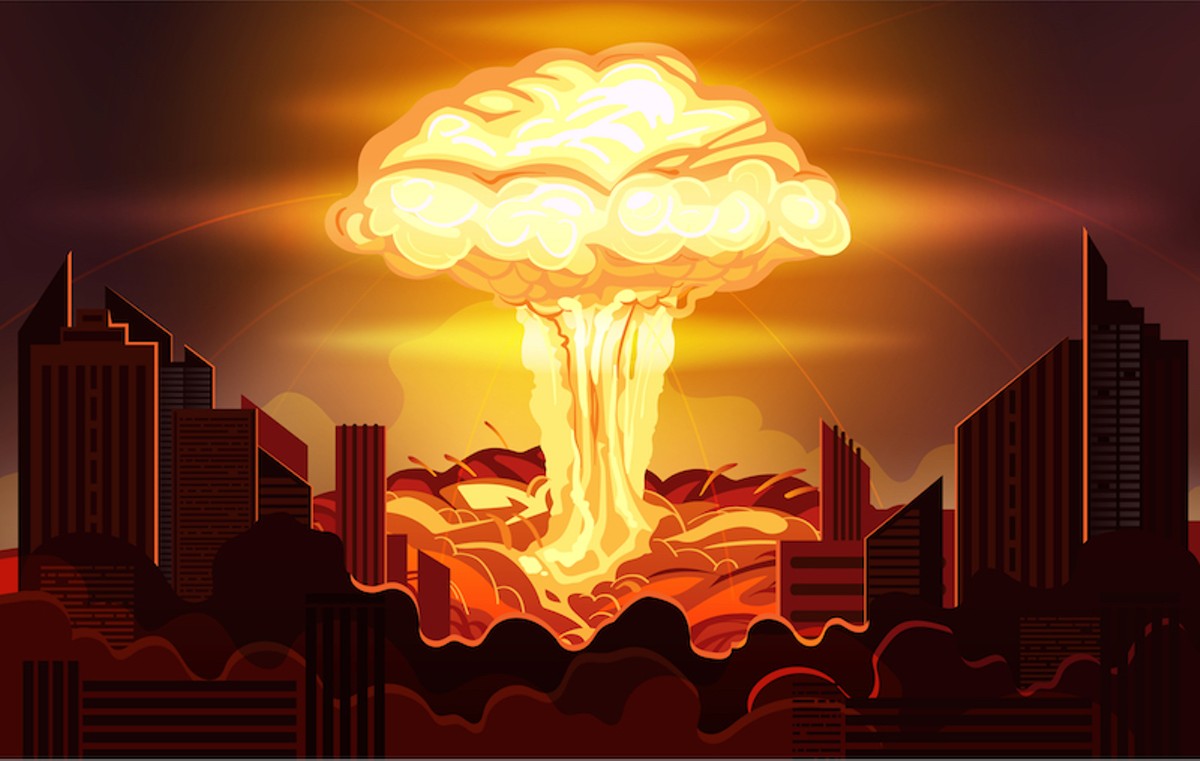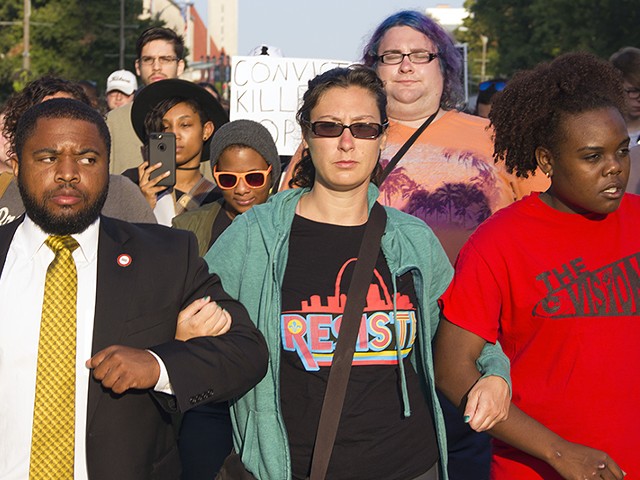
The official term for what's happening in Bridgeton Landfill, which is currently smoldering at an average of 200 degrees, is a subsurface smoldering event (SSE) or a subsurface reaction (SSR). That's what the EPA and Republic Services Inc., the company that owns Bridgeton Landfill and adjacent West Lake Landfill, call it.
A spokesman for EPA region 7, which includes Missouri, told the Hill in 2015 that the landfill garbage is "not actually on fire but only smoldering, a common occurrence, and the agency does not believe local residents are in immediate risk."
(Residents will tell you the only reason EPA doesn't call it a fire is because the agency is in Republic's pocket. Republic, of course, denies this and dismisses residents' accusations as fear-mongering. "We've been the only adult in the room for a long time," company spokesman Russ Knocke told Bloomberg in September. "It's been this spin-up of noise and fear and anxiety, and we generally feel like we've been the only ones that have been trying to say, 'Guys, here's the science.'")
At the meeting, LaVanchy continues to applause. "I'm going to call it a fire because I want to say that I don't think it's fair for a company that has a lot of money to be able to attempt to buy their way out of scientific proof," the assistant fire chief says. "I'll tell you, SSE and SSR are exactly what I deal with and have been dealing with in my career of now 27 years. It is a fire."
Next is Robbin Dailey, who filed a lawsuit against Republic Services last year after tests found radioactive thorium-230 particles at concentrations 200 times higher than background levels under the floorboards in her kitchen, on basement window ledges and in the backyard of her home in Spanish Village: "We're just hard-working, middle-class Americans who are trying to retire in peace and live with dignity. We're in the shadow of a disaster waiting to happen that won't allow us any peace."
Kirbi Pemberton, who's lived within five miles of Spanish Village since her birth in 1971, brings to the podium a poster decorated with photos of her daughters. Her voice trembles, but not from fear.
"My daughter Kristee Pemberton was diagnosed with a glioblastoma multiforme at the age of eight and passed away at the age of twelve," she says. This type of brain cancer can be "caused by ionizing radiation and is found in mainly 60-year-old men."
"My second daughter has fertility issues," Pemberton continues, looking up at Kelly. "She has not had a menstrual cycle since 2014. She's ready to get married and have babies. Does that seem possible?
"My third child, Kassidy. Boy, it's been quite a year. She's been hospitalized from February till July 17th of this year with depression, anxiety and bipolar, which was the No. 1 thing on Dr. [Faisal] Khan's health survey when he went around," she says, referring to a St. Louis County odor and emissions survey.
"Then I have my youngest daughter, who has dinosaur teeth," Pemberton says, pausing to let the unusual diagnosis sink in.
"Literally, dinosaur teeth that grow out from the middle of her mouth. This has affected my entire life. My husband had grade-nine prostate cancer. I've had a hysterectomy. I've had lumps taken out of me the size of baseballs. This has ruined my entire life. This needs to be cleaned up.
"It's time to help us. It's time."
BrieAnn McCormick, a teacher raising two children with her husband in Spanish Village, lists her family's health problems: "low muscle tone, a languish disorder, asthma, epilepsy, eczema, Ménière's disease, low liver function and severe dermatitis. I think it is important to note that none of these ailments occurred before we were in this home.
"I've watched water fall down a radioactive hill into a sewer ditch. I've had my home tested by a reputable law firm that has found high levels of radiation in the vacuum cleaner, RAY-DEE-YUM. Imagine looking at your carpet having flashbacks of your babies crawling on it after being told that there's radium in it.
"Hell just continues to get hotter," McCormick concludes. She asks Kelly to make sure the EPA "is not just worried about the bottom line."
Volunteers hold Meagan Beckermann's posters while she speaks. One is a collection of family photos. The other shows the stages of her eight-year-old son Trevor's condition.
"We moved here, less than two miles from the landfill, before he was one year old," Beckermann says, starting to cry. "Trevor has an extremely rare form of alopecia, alopecia universalis. It has caused him to lose all of the hair on his body, which has never grown back. To me, this is his body's way of calling out for help.
"My youngest, my daughter Faith —" the sob building in Beckermann's throat finally breaks. She braces herself against the podium, barely responding when someone offers to read the rest for her. "Faith was my only child who was conceived in our current home here. Unfortunately, we lost her in a miscarriage during my second trimester of pregnancy three months ago — the worst day of my life.
"The second worst day of my life was when I found out my home is less than two miles away from a leaking, burning radioactive landfill."
The HBO documentary Atomic Homefront includes a scene from a previous community meeting three years — and one presidency — earlier. At that meeting, a vocally angry crowd asked the regional EPA's public affairs deputy director if she would live in their neighborhood, knowing what she knows. The official said she would. Kirbi Pemberton then stood, her face red, and unleashed the ruinous fury of a grieving mother. The official visibly recoiled. The EPA kept the Moms at arm's length ever since.
Until Trump. This meeting feels different. In fact, after another Spanish Village mother asks why the EPA ignores residents' pleas to test more areas for radioactive contamination ("What are you afraid you'll find?"), something wildly unprecedented happens: Kelly apologizes.
"I want you to know I'm taking notes, and we're ..." Kelly solemnly lowers his eyes and grabs the microphone with his left hand.
"We're sorry."
An apology is only words, Kelly admits. "There is no way my words can in any way give you back the things that you lost, and I understand that. But what we are trying to do is be very proactive and not get half of a solution but get to a solution."
Kelly has briefly interrupted the testimony, he explains, to share some news: "We're going to go ahead and test additional areas" for radioactive contamination. The crowd applauds loudly for seven seconds before he can continue.
"We are moving as rapidly as we can and moving in a direction that has a good record, that will allow us to defend that record, and that will get the entirety of this remediated in a way that is going to make it safe so that you all believe that it's safe," he says. He gestures toward the previous speaker and adds, "You talked about trying to test in other areas? We're going to do that."
"I think we will take that as a victory for right now," Nickel says to applause.
Later, after another hour of grueling testimony, Chapman tells St. Louis Public Radio that the decision to do more testing makes her feel hopeful for once: "There's something about this guy that makes me believe him."






